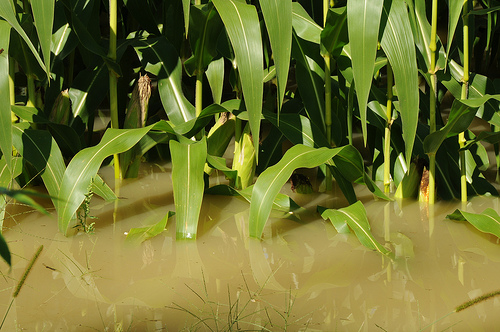As the cool, wet weather continues, problems for farmers are compounding as much acreage will not be planted at all. Not since the American Farm Bureau has been tracking acreage planting has so much of a percentage of arable land not been planted going back to the 1970’s. In addition, many farmers face low commodity prices and high debt from years of borrowing to buy more land or expensive farm equipment.
The Seiberling Farm in Norton has reported that the sweet corn planted has germinated and growing but is struggling to make “normal growth” with the wet soil and continued cold nights as some temperatures have dipped down into the 40’s over the past few weeks. In addition to the sweet corn, the peppers are showing slow growth and may be permanently stunted from the cold and wet weather. Disease problems on plants will also mount as continued high humidity and wetness is a recipe for early tomato blight and powdery mildew that attacks cucumbers, squash and other curcurbits. With over 1000 species of identified fungi that cause the condition known as powdery mildew, many fungicides are ineffective although calcium chloride and potassium bicarbonate salts have been shown effective at stopping the spread of the disease and even reversing the infection and ultimately eliminating it.
In the ornamental plant world, some trees and shrubs will no doubt suffer as water logged soils deprive oxygen hungry roots for this needed element. In well-drained soils though, the continued rain is a blessing as many gardeners are relieved from the drudgery of necessary watering. Over mulching plants (over 3 inches) will create too wet of soils that again will deprive roots of oxygen. Also, powdery mildew will be a problem on vegetable plants in home gardens just as on the farm and on ornamentals such as roses and some herbaceous perennials. Again treatments of bi-carb (potassium bicarbonate) and calcium chloride (Dowflake ice melt) are effective and quite safe to use on food crops such as curcurbits, strawberries, raspberries and so on.
Some break in the weather of nights in the 60’s and days in the 80’s would bring relief. While things are not great they still beat the year of 1816 that in Ohio was described as having a year without a summer as some snow fell in July. That year crops failed and in an entry in a newspaper from that time, people survived by shooting the now extinct passenger pigeon as the massive flocks flew overhead.

